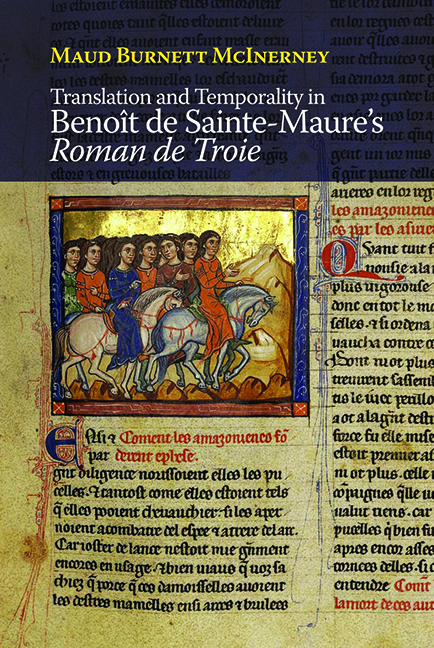Book contents
- Frontmatter
- Dedication
- Contents
- Acknowledgements
- List of Abbreviations
- Introduction: Trojan Time Machines
- 1 A Cupboard in Athens: Translating Troy
- 2 A Very Old Book, or How to Predict the Past
- 3 Ladies’ Time
- 4 Queer Time for Heroes
- 5 Hector in the Alabaster Chamber: Ekphrasis and its Discontents
- Conclusion: Trojan Futurities
- Appendix: The Manuscript Tradition of the Roman de Troie
- Bibliography
- Index
- Gallica
4 - Queer Time for Heroes
Published online by Cambridge University Press: 07 October 2022
- Frontmatter
- Dedication
- Contents
- Acknowledgements
- List of Abbreviations
- Introduction: Trojan Time Machines
- 1 A Cupboard in Athens: Translating Troy
- 2 A Very Old Book, or How to Predict the Past
- 3 Ladies’ Time
- 4 Queer Time for Heroes
- 5 Hector in the Alabaster Chamber: Ekphrasis and its Discontents
- Conclusion: Trojan Futurities
- Appendix: The Manuscript Tradition of the Roman de Troie
- Bibliography
- Index
- Gallica
Summary
“Marriage, which has been the bourne of so many narratives, is still a great beginning,” remarks George Eliot at the end of her grand narrative of many marriages, Middlemarch. The word bourne is a curious one, archaic already when Eliot was writing. It can be a terminus, a limit, a destination, and indeed this is precisely how marriage functions in the happily-ever-after ending of the Roman d’Eneas: the courtly hero has won his lady and what comes after the wedding – the birth of children, the establishment of dynasties – is essentially non-narratable, at least within romance time. But what about those for whom marriage isn't a happy ending? Or those for whom, more simply, marriage just isn’t? A bourne can also be a boundary, the line between one plot of land and the next, a sign establishing difference. Looking from the Roman d’Eneas to the Roman de Troie, we need to ask what happens when marriage is not a great beginning. For Troy there can be no happily-ever-after. The Horse delivers its treacherous progeny, towers burn, streets run with blood, Priam is cut down upon the altar, Polixena on the grave of Achilles, and Hecuba stoned to death. Even for the victors, things don't go well. Benoît provides a summary of the Greek homecomings, derived from Dictys: Agammemnon is murdered by Clytemnestra, Pirrus dies at the hands of Orestes because of his abduction of Helen's daughter, Ulysses is haunted by nightmares and eventually killed by Telegonus, his unrecognized son by Circe. For the heroes of Troy, it turns out, romance time, associated with the love of women, the contract of marriage, and the establishment of heterosexual bonds, is not all that it's cracked up to be. The return to domesticity and the embrace of family is no great new beginning but only a return to death. Both romances recognize this phenomenon, although while the Roman d’Eneas, as we have seen, works hard to produce a positive and secure vision of the heterosexual bonds of marriage and courtly love, the Roman de Troie, ultimately, doesn't bother. Each text, moreover, proposes alternatives to romance time and the imperatives of heteronormativity, even if only to foreclose them.
- Type
- Chapter
- Information
- Publisher: Boydell & BrewerPrint publication year: 2021

